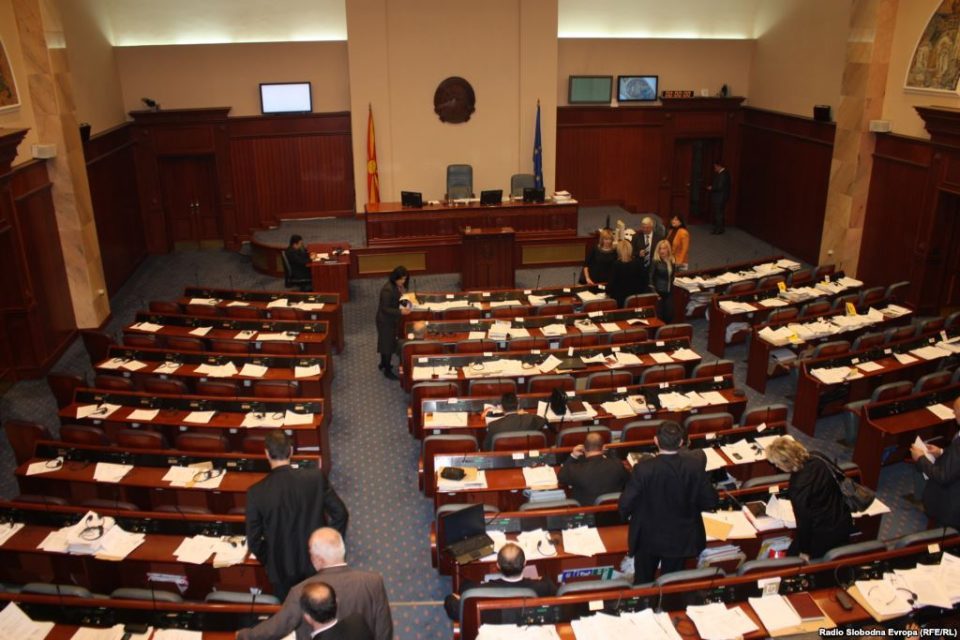Confusion reigned in the Macedonian Parliament on Wednesday as changes to the Criminal Code were introduced by the Government, than withdrawn and ultimately the ruling majority accepted to advance them further into law. If adopted in full, the changes would significantly weaken down the penalties provided for public officials who unlawfully sign procurement contracts or otherwise abuse their office.
Given the speed with which the changes are forced through and the timing, it seems clear that they are being proposed in order to allow members of Parliament charged under the numerous politically motivated cases initiated by the Special Prosecutors Office to escape jail time, in exchange for their votes to rename Macedonia into North Macedonia. This is the second amnesty law of sorts being pushed through the Parliament, after the members of Parliament charged with “terrorism” over the April 27th 2017 incident in the Parliament already successfully negotiated a targeted amnesty law in exchange for their votes.
Prime Minister Zoran Zaev, who was elected on the back of promises of ruthless crackdown on corruption and on claims that he will not allow amnesty for political officials accused of wrongdoing, yesterday sheepishly acknowledged he is still short of the necessary 81 votes to rename Macedonia into North Macedonia. A draft proposal to water down the Criminal Code was introduced in the early afternoon, but was then withdrawn. Government spokesman Mile Bosnjakovski tried to reassure angry SDSM supporters on his social media account that the Government is not proposing changes to the Criminal Code that will allow their political opponents who SDSM has vilified for years to avoid prison time. Justice Minister Renate Deskoska also denied that the Government is involved in this. But, shortly later another version of the same proposal was submitted again, by a group of SDSM and DUI members of Parliament, one of whom probably mistakenly acknowledged that the proposal comes from the Government and is not an independent initiative by their group in Parliament.
– We saw three versions of the proposed changes to the Criminal Code from yesterday until today. We demand that you explain to us which version is being put to vote. Members of Parliament can’t follow what is going on, said Nikola Micevski, head of the VMRO-DPMNE group in Parliament. Miceski also raised objections over the move by Speaker Talat Xhaferi to propose the changes under the “European flag” procedure, used to push laws through an expedited procedure if they are needed to align Macedonian laws with those of the European Union.
– You are again putting the European flag on laws that don’t meet basic requirements to be proposed under this procedure. You spoke about rule of law and justice until you were blue in your face, and now you violate both the Rules of the Parliament and the laws, said Miceski.
Some of the likely beneficiaries of this latest proposal for amnesty could be former Culture Minister Elizabeta Kanceska Milevska, who is charged of abuse of public funds during the construction of a museum and a theater in Skopje. Vladanka Avirovik expects that the law will help get her son Vasilije out of prison. He is sentenced to three years in prison over a public contract to excavate coal in the REK Bitola mine. Zekir Ramcilovic is also not directly charged, but he is close to businessman Sead Kocan who is sentenced to six years in prison over the same contract. Kanceska Milevska, Avirovik and Ramcilovic voted in favor of opening the process to amend the Constitution, but have clearly indicated that they need to get the legal charges removed from them or their family members and political allies if they are to vote in the final move to amend the Constitution and rename Macedonia into North Macedonia.
The changes could also be used in some of the numerous politically driven cases which the Special Prosecutors have begun against former Prime Minister Nikola Gruevski, former UBK security service director Saso Mijalkov, former Interior Minister Gordana Jankuloska, former Transportation Minister Mile Janakieski and other officials who faced political persecution.





Comments are closed for this post.